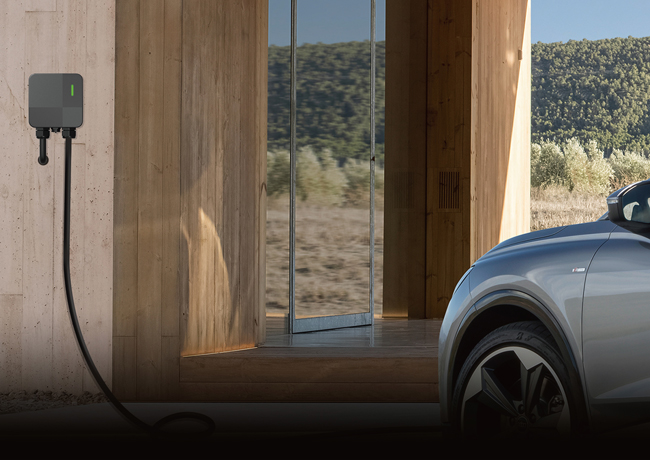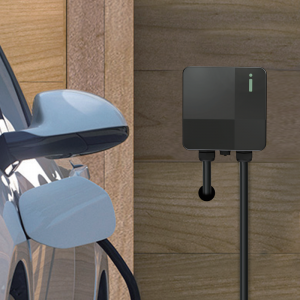
Streamline your electric vehicle charging at home with a safe, reliable, and cost effective 11kw car charger. EVSE home charging station comes non-networked with no activation required. Eliminate “range anxiety” by installing a level 2 EV charger in your home. EvoCharge provides an estimated 25-35 miles of range per hour of charging. Utilizing the universal IEC 62196-2 plug, work with all EV & Plug-In Hybrid's in the United Kingdom & Europe.
Why charge an electric car with 11kW?
At home you can use a 7 kW household charger, but in other places, for example in the office or in a supermarket car park, you can use faster chargers that offer up to 43 kW output power from the power supply. So if you've upgraded your electric vehicle's on-board charger to support 11kW charging, or it comes standard with an 11kW charger, you could potentially be charging your vehicle 50 pounds heavier than you would at home. You can still connect your electric vehicle to a public charger with a power of more than 7 kW or 11 kW, but this is the maximum consumption of your electric car. The 7 kW electric vehicle charging point provides an additional range of 30 miles per hour.With an 11 kW charging station you can travel 61 kilometers at the same time. NOTE: These differ from the 100+ kW DC fast chargers found at motorway service stations. The DC charger bypasses the built-in charger and charges the battery directly, so it's not limited to a specific outlet.
Is it worth it?
If you want to charge your home at 11kW or more, you will need to speak to an electrician to find out if it is possible to convert your home's power supply to three-phase electricity.It's simple, but the extra cost isn't worth it unless you really need to charge your vehicle in 5 hours instead of 8 every night. At the time of writing, Vauxhall was offering an additional peak charge capacity of 11kW for £360 on some EVs – interestingly some models already have it as standard – to reduce charging times at some public charging stations. Whether it's worth it is entirely up to you. In the case of a family car to drive maybe not, in the case of a daily commute it could be the .Only you can decide.
Which EV fast charger do I need?
Deciding which fast home charger you need is more than meets the eye. We will see how the loading time is calculated and what factors to take into account. Finally, we give our recommendations based on some common use cases.

How much energy does your electric car use?
For petrol vehicles, fuel consumption is calculated in liters per 100 km. Watt-hours per kilometer are often used for electric vehicles.
Medium EV (Tesla Model 3): 180 Wh/km
Large EV (Tesla Model S): 230 Wh/km
SUV EV (Tesla Model X): 270 Wh/km
Driving 10 km per day with the model 3 consumes approx. 180 x 10 = 1800 Wh or 1.8 kilowatt hours (kWh) per day.
How far you travel
We calculate your daily energy consumption based on the distance you typically travel in a year. Each day will be different, but it will give you a clue.
km per year / 365 = km/day.
15,000 km/year = 41 km/day
25,000 km/year = 68 km/day
40,000 km/year = 109 km/day
60,000 km/year = 164 km/day
How much energy do you need to charge? ?
To find your daily energy consumption when charging an electric vehicle, multiply your km/day by Wh/km for the car.
Tesla Model 3 is 41 km/day = 41 * 180 / 1000 = 7.38 kWh/day
average EV - Tesla Model 3 41 km/day = 7 kWh/day 68 km/day = 12 kWh/day 109 km/day = 20 kWh/day
Large Electric Vehicle - Tesla Model S 41 km/day = 9 kWh/day 68 km/day = 16 kWh/day 109 km/day = 25 kWh/day
SUV - Tesla Model X 41 km/day = 11 kWh/day 68 km/day = 18 kWh/day 109 km/day = 29 kWh/day
How fast can you reload?
You may not have thought about it before, but a gasoline car's "recharge rate" is the rate at which fuel leaves the tank, measured in liters per second. When charging electric vehicles, we measure it in kW. There are three common charging rates for home chargers: standard wall socket: 2.3kW (10A) single phase wall charger: 7kW (32A) three phase wall charger: 11kW (16A x 3 phase) wall charger with a With an output of 7 kW, you get 7 kWh of energy per hour of charging.
How long does it take to load?
We can calculate the charging time by multiplying the amount of energy needed by the rate at which it is fed into the electric vehicle.
The Tesla Model 3, which travels 41 km per day, uses about 7 kWh per day. 2.3kW charger takes 3 hours to charge, 7kW charger takes 1 hour to charge, 11kW charger takes 40 minutes assuming charging every day.
Medium EV - Tesla Model 3 with 2.3 kW charger 41 km/day = 7 kWh/day = 3 hours 68 km/day = 12 kWh/day = 5 hours 109 km/day = 20 kWh/ Day = 9 hours
Medium EV - Tesla Model 3 with 7kW charger 41 km/day = 7 kWh/day = 1 hour 68 km/day = 12 kWh/day = 2 hours 109 km/day = 20 kWh/day = 3 hours
Medium EV - Tesla Model 3 with 11kW charger 41 km/day = 7 kWh/day = 0.6 hours 68 km/day = 12 kWh/day = 1 hour 109 km /day = 20 kWh/day day = 2 hours
Post time: May-26-2023
